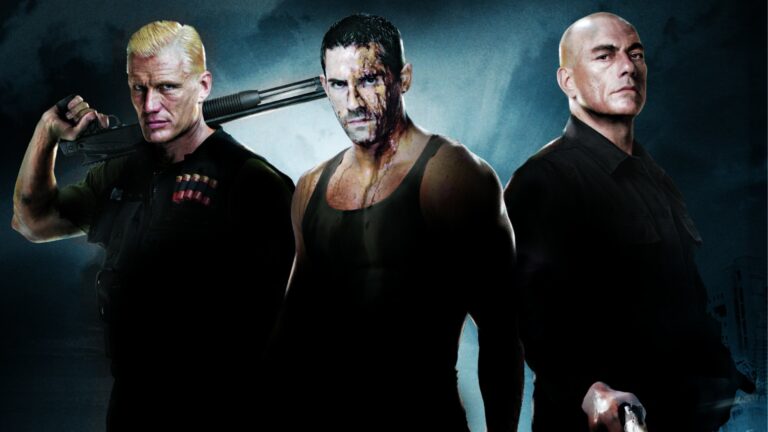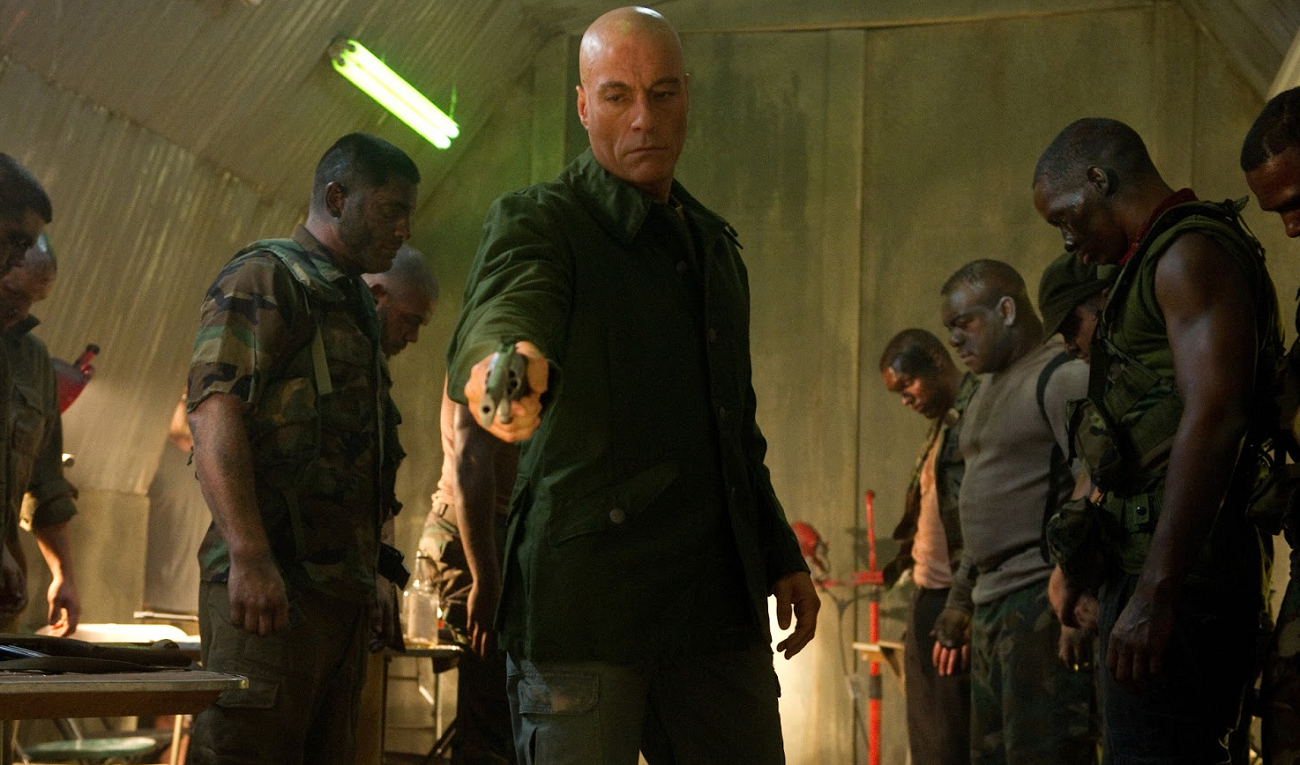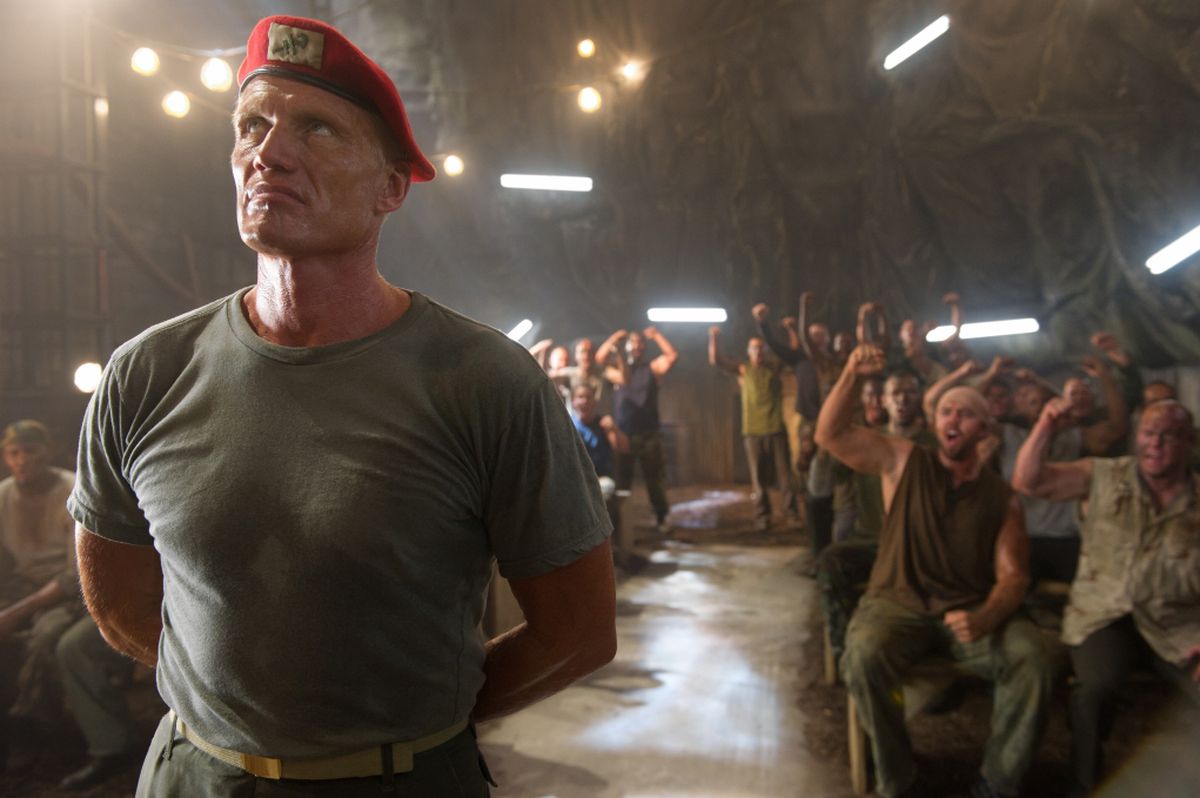
Exploring the ultimate cinematic risks of this unheralded action classic!

I write the title to this piece as a statement, but it’s more of an argument. I hope that of all the people that read this someone will offer evidence that this is not true, because we need more films like Universal Soldier: Day of Reckoning. The closest approximation I can think of is The Terminator. Cumulative internet chatter has gradually opened up to the idea of Terminator as an implacable boogeyman pursuing Sarah Connor to punish her for something that hasn’t happened yet, a deed that will have epic consequences in the distant future. Horror through a Kafka filter, physically represented in the skeletal hardness of the machine with a skullhead’s grin and LED red eyes.
But even Terminator doesn’t have the harrowing, relentlessly hostile worldview of this fourth, and so far, final installment of the Universal Soldier franchise. We’re also deceived by the marketing. I don’t remember any marketing for this movie on initial release, but the poster would have you believe that Deveraux and Scott are the stars in this film. Jean-Claude Van Damme and Dolph Lundgren actually play supporting characters and have very limited screentime. The film is carried on the broad and capable shoulders of Scott Adkins (Boyka Undisputed, Hard Target 2, etc.) In the hands of director John Hyams (son of filmmaker Peter Hyams), Universal Soldier undergoes a radical transformation. While retaining the basic underpinnings of resuscitated Vietnam veterans being repurposed for counter-terrorism, Hyams and his collaborators bring a level of mythology and world building that is both exciting and terrifying. There’s a gritty, high tech-low-life cinematic combo to Day Of Reckoning and Regeneration, the previous film, that places the franchise in a Venn diagram of military sci-fi and cyberpunk.
UAMC Looks Back on Day of Reckoning
Film fans debate the merits of daring, risk-taking independent cinema versus predictable studio product. Day Of Reckoning serves a great example to support this argument. There’s fight scenes that display unrestrained brutality. The sex scenes, usually designed to give you cheap thrills in typical action films, also have an underlying violence to them. This is a world where primal needs are demanded with force, but it takes a little while to get there. The first few minutes of Day Of Reckoning start in domestic bliss. A little girl wants her daddy to look for monsters in the house. A complying father leaves the comfort of his bed and his stunning wife to investigate. There’s a few seconds of spatial disorientation, till we realize we are seeing things from dad’s POV. This is a camera trick rarely used in action movies because it’s considered anti-cinematic. From the very first shot Day Of Reckoning challenges our assumptions of what is cinematic. John Hyams uses this POV shot to replicate the drowsy state of a man recently wakened, moving through the house room by room, to suddenly be thrown into the horror of a home invasion. Masked men stand idly in the kitchen staring at John (Adkins.) And now we’re helplessly locked into John’s POV as they proceed to beat him with crowbars, over and over, displaying savage glee in their work, before bringing his wife and daughter to the now blood-spattered kitchen to murder them execution-style.
We get a little breather after this opening where John recovers from the attack, and we absorb the fact that it was Deveraux (JCVD) who perpetrated the assault and murder, and we know were in a very different place from the first Universal Soldier. In the opening minutes of the movie we have been treated to a daring re-imagining that might have never happened if Carolco, the original holder of the rights to the Universal Soldier property, hadn’t gone bankrupt. The road to this revitalized Universal Soldier didn’t happen in a straight line. After Skyvision Entertainment acquired the rights to the property from Carolco, what came from this were two made-for-TV movies that feature neither JCVD nor Dolph. Two films I haven’t seen, so I won’t go into them here. These were followed by Universal Soldier: The Return (1999.) The path leading to Reckoning draws parallels to the current schizophrenic state of the movie industry with regards to remakes/reboots/re-imaginings. In The Return they make the highly questionable decision to make Deveraux human again, complete with a wife and daughter. I’m not getting into how a corpse from the Vietnam era was reanimated to the point where he could reproduce, but you see my point. Verisimilitude has its limits. A reanimated corpse from the Vietnam era turned into a supersoldier is no more believable, but when you couch this idea with big explosions, big guns, and badass action, it goes over easier than a corpse with no skills other then killing suddenly having to support a family. That’s good material for an action comedy.
Part of the Universal Soldier Legacy

Lucky for us, in Regeneration and Day Of Reckoning, the filmmakers disregard anything that was done with the property after the first Universal Soldier. Hyams and his team are as remorseless with the source material as this current generation of UniSols. This secret army of the dead, maintained in ice coffins and released from their cold sleep for the purpose of removing life from the planet for a society that doesn’t appreciate them, now has a purpose. The UniSols embrace their outcast status, their superior combat skills, and go about gathering themselves unto one mind and one cause.
But we don’t learn this right away. First comes the quiet period of recovery for John after the home invasion and assault. The calm before the storm. In this time of convalescence and grief, John receives a call from a friend, having a sudden need to tell John things. As it always happens in pre-arranged meetings in mysteries, John’s friend is dead by the time John connects with him. He’s left behind a small clue that leads John to a strip club, and from there we follow John into a downward spiral of sleeper agents, complete with government-funded black books-projects, and cloned UniSols. A journey of self discovery for John, punctuated by episodes of chaotic violence. The fight scenes in Reckoning are ungraceful and rough. The contenders are motivated by the prime directive of inflicting terminal bodily damage on each other. Over the course of reveals and stunts, we’ve detoured into an action film where the screenplay was retooled from a story of body horror by David Cronenberg. In a very short time John has gone from walking with a cane to participating in fights with a skill equal to that of his attackers. Fingers John lost in axe fight reappear just days later, fully functional. His speed, agility and endurance increase to incredible levels, enabling John to clear the last set of henchmen and to travel upriver, and down into a bunker to confront his personal Heart Of Darkness.
Day Of Reckoning didn’t do as well financially as the first Universal Soldier, and the same fate befell Regeneration. You can make an argument that misleading marketing put people off from seeing the movies. Placing JCVD and Dolph’s faces big and prominently in the posters, and then making Scott a tiny figure showing us his back in the foreground, when what we saw was the opposite, might upset fans of the franchise. To show JCVD, the former hero of the first entry, as the sadistic leader of an underground army of genetic freaks whose only pleasures are fighting and fucking, definitely put off fans that get misty-eyed over the first one. If you were a kid when you first saw Universal Soldier and made JCVD a part of your pantheon of personal heroes, you’d be repelled at this current version of Deveraux. Dead-eyed, with his face painted in a pattern not unlike Colonel Kurtz, Deveraux now embodies the madness that his commanding officer (Dolph) gave in to, the same madness that overcomes certain soldiers under prolonged combat.
But, How Ultimate is it?
Day Of Reckoning is an action movie set in a world of an encroaching psychopathic army. We see very few civilians, and they scatter quickly when the violence explodes from the calm. It’s an unforgiving world, without a love to defend, without the friendships and sense of duty that motivate the hero of standard action films. What we have here are discarded heroes, an aggregate of trained killers bound together by homicidal drives, and their leader is the former hero of this franchise. We’re in a world where we can only apply the Criteria of the effective action film through a distorted filter. If you can’t remember this Criteria, the Primary one is:
Does the story’s structure and pacing place increasing demands on the protagonist’s abilities, forcing him to expand his skillset by engaging both his mind and body in the process?
Yes! Our “hero” starts as a neutral with zero knowledge of the gathering hidden army. After the home invasion and assault his strength, agility and fighting skills increase in proportion to his growing awareness of what he’s involved with. John goes from a passive victim to active participant to central figure with a personal agenda. Which takes us to the Secondary Criteria:
Does the antagonist succeed in placing increasing demands on the protagonist, forcing him to increase his skill set and resourcefulness?
Absolutely! Deveraux and his army take John to the abyss, from which it takes John 9 months to recover. And to continue getting answers to his questions John has to put himself in harm’s way, only to discover that he’s very capable of not only deflecting violence, but dishing it out in equal or greater measure. We’re in the position of having to redefine what a hero is. John is a hero in the same way that Mike Hammer is a hero operating with a strict code, and not very different from Jack Reacher. The times are different, but they’re all operating with a code that was put on paper, arguably, in 1929 with Red Harvest and the Continental Op.
Day Of Reckoning takes cinematic risks. From the sudden plot twists, to the psychotic violence, disconnected from any good intentions, to the eerie score, Reckoning will jolt you into paying attention. If you’ve gone numb from too many action movies assembled from an AI plot generator, you need to the see this movie.